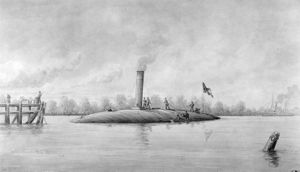CSS Manassas
 |
|
| History | |
|---|---|
|
|
|
| Name: | Manassas; originally Enoch Train |
| Owner: | Boston Steam Tow-Boat Co. |
| Builder: | James. O. Curtis, Medford, Massachusetts |
| Launched: | 1853 or 1855 |
| Commissioned: | September 12, 1861 |
| Decommissioned: | April 24, 1862 |
| Fate: | Sunk in battle April 24, 1862 |
| General characteristics | |
| Class and type: | Steam tug,Ironclad |
| Displacement: | 387 tons |
| Tons burthen: | 384 1⁄2 tons |
| Length: | 143 ft (44 m) |
| Beam: | 33 ft (10 m) |
| Draft: | 17 ft (5.2 m) |
| Propulsion: | Steam engine |
| Complement: | 36 officers and men |
| Armament: | 1 64-pounder Dahlgren, later replaced by 1 32-pounder |
CSS Manassas, formerly the steam icebreaker Enoch Train, was built in 1855 by James O. Curtis as a twin-screw towboat at Medford, Massachusetts. A New Orleans commission merchant, Captain John A. Stevenson, acquired her for use as a privateer after she was captured by another privateer (later gunboat) CSS Ivy. Her fitting out as Manassas was completed at Algiers, Louisiana; her conversion to a ram of a radically modern design made her the first ironclad ship built for the Confederacy.
Covered with 1.25-inch (32 mm) iron plating, her above-water hull was reshaped into a curved "turtle-back" form; at its lowest when fully loaded, the hull projected only 6 1⁄2 feet above the waterline, not counting her smokestacks (surviving accounts and period illustrations vary showing Manassas was equipped with either a single or two side-by-side smokestacks, possibly slanted back at a rakish angle). The convex shape of her iron-plated topside caused cannon shot to glance off harmlessly. She was 128 feet (39 m) in length, overall, and had a 26-foot (7.9 m) hull beam and 11-foot (3.4 m) draught. Her bow was fitted with a pointed iron ram to stave holes in Union vessels, and she also carried a forward-firing cannon behind a single gun port with an armored shutter. Her low profile made her a difficult target, while her curved armor iron plate protected her against all but the most well-directed Union cannon fire. Fast moving, lying low in the water, she looked like a floating cigar or submerged egg shell and was described by Union intelligence as a "hellish machine."
...
Wikipedia
